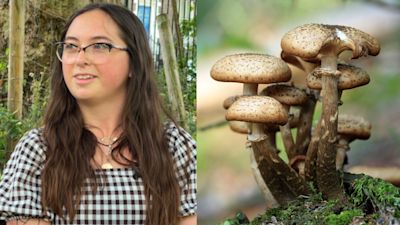The TikTokers who are 'microdosing' magic mushrooms and LSD - and say it helps their mental health

By Cree-Summer Haughton, ITV News' Here's The Story
People who are 'microdosing' psychedelic drugs like LSD or mushrooms on a regular basis are sharing their experiences on TikTok, saying it helps with their mental health.
A microdose involves consuming a low dose of a psychedelic substance, such as LSD or psilocybin mushrooms, more commonly known as magic mushrooms.
On TikTok, there has been more than a million views of videos posted with the microdosing hashtag. Some of those who have uploaded videos claim microdosing has made them feel more creative and productive. Others say it has helped with their depression and chronic pain.
However, LSD and magic mushrooms are illegal – they are a Class A drug in the UK and using them could result in a prison sentence of up to seven years.
Hollie is among those posting videos about microdosing on TikTok. She says it has helped with with her post-traumatic stress disorder (PTSD). She spoke to ITV News about why she turned to microdosing.
"I've just really found that nothing else worked for me, I've been on antidepressants before and they just, they did make me feel happier, but I just feel like they kind of masked the issue", Hollie says.
"Whereas now that I've started microdosing, I feel like I'm actually tackling the issue. I'm going to the root cause instead of just putting a blanket over it."
Hollie says she microdoses three times a week. "I just feel a lot happier, sometimes I feel nauseous...but that's just me", she says.
How does Hollie feel about microdosing knowing that it involves taking Class A drugs and is illegal?
"I don't really feel any kind of way about it, to be honest", she says.
"I feel like if I made a big deal out of it in my head [that] I'm taking an illegal substance every day or like every three days...I think it would affect how it affects me."
Is there any scientific evidence about whether microdosing works?
A recent study found that a single dose of a hallucinogenic chemical found in magic mushrooms can dramatically reduce symptoms of intractable depression.
It was the largest study of it's kind but it doesn't actually prove that microdosing works.
Dr James Rucker, who was involved in the study, said: "It's very hard to study microdosing and it's mostly because of the law surrounding psychedelics. It's almost impossible under current legislation to give people psychedelics to take home... some people have done studies with a self blinding technique - there's no evidence that this was much more than a placebo."
Dr Christopher Timmerman, a researcher at the Centre for Psychedelic Research at Imperial College London, told ITV News that while some studies in microdosing have taken place, bigger ones need to be carried out to get a better sense of whether the practice is as effective as people claim in treating mental health issues.
When was asked about the effectiveness of microdosing, he said: "There's been some studies that indicate that apparently microdosing is useful for mood enhancing effects, like reducing anxiety for example.
"However, most of the studies that have been done with proper controls with proper placebos show that indeed this effect appears to be mostly a placebo effect. An effect that is induced primarily by suggestion.
"Although, it could be that we need better ways to measure the kind of outcomes related to what people refer to when they say that they're having benefits from microdosing."
"I think a big limitation when it comes to this is that when people are doing it in non-controlled settings, we don't know exactly the substance they take and how much they take of that substance.
"Until we do larger and proper controlled studies, [it] is very hard for us to know what is really going on when it comes to microdosing."
The most recent research in microdosing was published in June by UBC Okanagan. It involved about a thousand people microdosing magic mushrooms for a month. They reported that their mood and mental health did improve.
However, Dr Zach Walsh from UBC Okanagan, who led the research, added: “Despite the promising nature of these findings, there is a need for further research to more firmly establish the nature of the relationship between microdosing, mood and mental health, and the extent to which these effects are directly attributable to psilocybin rather than participant expectancies about the substance".
In other words, the research was unable to determine the extent the mushrooms played in altering the research participants' mood, and how much of it was down to a placebo effect.
Are there any risks when microdosing?
According to Dr Chris Timmerman, there isn't any known toxicity when it comes to psychedelic substances - however, the drugs could affect those with heart conditions.
He said: "With pre-existing heart conditions, theoretically at least it is possible that a sustained exposure to LSD even in the form of microdosing can be potentially dangerous.
"The main issue here is that when people have big doses of LSD and psychedelics, from survey studies, we know that they take it just a couple of times a year.
"Therefore, that exposure is fairly minimal. But the prolonged exposure from low doses could carry some potential risk."
Here's The Story is a new strand from ITV News bringing you stories worth knowing plus original journalism worth watching from our team of reporters. You can follow Here's The Story across ITV News' social media platforms, including on our Instagram account, or you watch the latest videos here on the ITV News website.